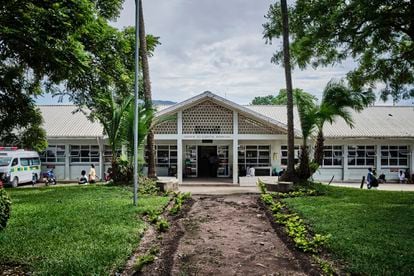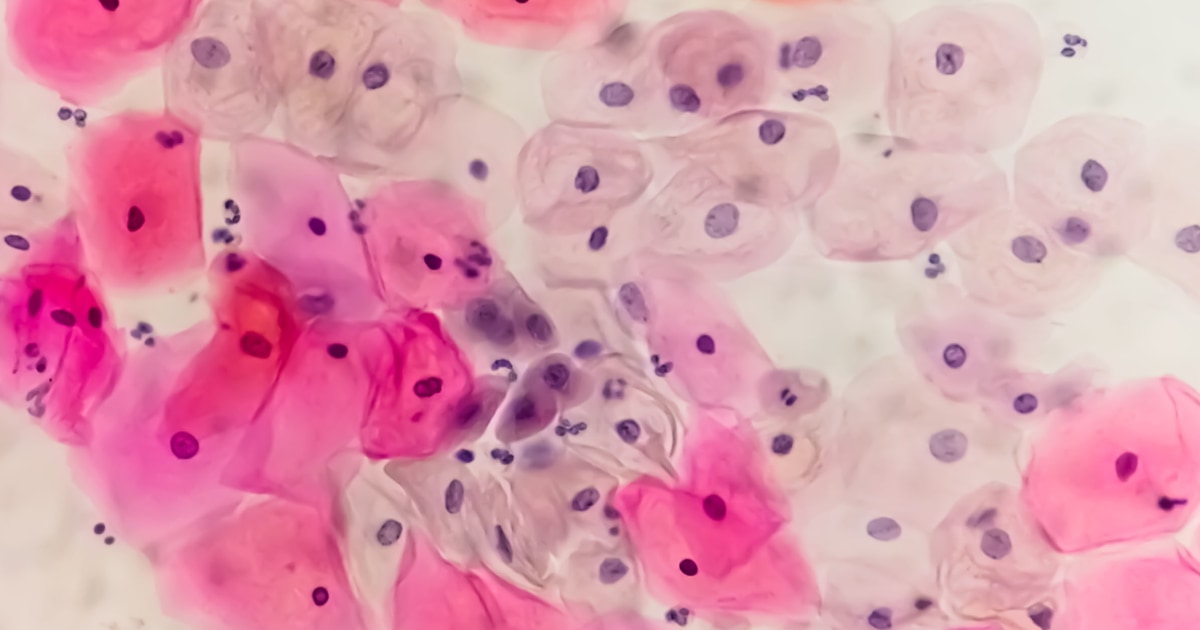Aliyanesa Nkunye is 43 years old and has a small voice.
Her eyes blur as she remembers a time that no longer exists: her cassava field, in Thyolo, a district in southern Malawi, her little stall where she sold cassava and where she earned enough money to feed her four children.
She was an Aliyanese, she was a farmer until one day in October when she was diagnosed with cervical cancer.
From that day on her life fell apart: her family and her husband abandoned her and she was left alone, sick and in charge of four children.
Since then, she never spoke to anyone about her illness until she joined support groups for cervical cancer patients in December.
“I feel lighter after talking about what is happening to me without feeling judged,” she says.
Malawi is the country in the world with the highest mortality rate from this type of cancer: almost 52 out of every 100,000 women die each year from this cause, a figure that is seven times higher than the world rate.
Nationwide, 5.4 million women ages 15 and older are at risk of developing cervical cancer.
Of the 4,145 women diagnosed in this State in 2020, 2,905 died, despite the fact that it is a disease that can be easily prevented through the human papillomavirus (HPV) vaccine, adopted by Malawi in 2019.
Aliyanesa spent five years with abdominal pain, altered menstrual cycle, and vaginal bleeding.
The late diagnosis, another of the health problems in this East African country, worsened her prognosis, and she is currently undergoing neoadjuvant chemotherapy, the treatment prior to surgery.
Although she has improved, cancer has changed her life and that of her children.
“I feel bad because they have had to stop going to school and have been forced to work on the streets to bring food home,” she laments.
It's sad that some men run away at a time like that.
You have to put yourself in the other person's place.
Justin Moses, husband of a patient
This woman describes her loneliness with an image: her neighbors see her coming home from the hospital, but they don't want to support her very much because if she dies they would have to take care of the funeral expenses.
Support groups are the only way out of it.
“We want to encourage them to create networks among themselves.
In these spaces they share the problems they are going through and thus they can talk about it.
We have seen that it has a very positive effect,” says Tifera Botomami, supervisor of the initiative, which the NGO Doctors Without Borders (MSF) created in 2021 at the Queen Elizabeth Central Hospital in Blantyre, in the south of the country.
The women meet before starting the second cycle of chemotherapy, when many of them have already experienced pain, loss of appetite, diarrhea, vomiting or hair loss.
Sitting in a circle on a mat placed in the hospital courtyard, the women listen to each other's testimonies.
Queen's Elizabeth Central Hospital is the referral hospital for thousands of people in southern Malawi.
In 2018, Médecins Sans Frontières (MSF) started a project on cervical cancer in this country, and in 2019 facilities were built at the medical center to be able to meet the upcoming demands for treatment.Diego Menjíbar
The high number of Malawian women dropping out of cervical cancer treatment made it necessary to seek strategies to achieve completion.
In January 2021, support groups for patients were created at this hospital in Blantyre, in the south of the country, where patients share personal experiences related to cancer. DIEGO MENJIBAR
During the sessions, emphasis is placed on therapeutic education, information is given to patients about the side effects of chemotherapy, the diet that should be followed during treatment is discussed, and different rehabilitation exercises that they can do at home are also shared. home.DIEGO MENJIBAR
After going through chemotherapy, many women suffer from body weakness, pain, diarrhea, vomiting and even hair loss.
They are the side effects of the treatment.
For this reason, part of the group sessions are dedicated to nutrition. DIEGO MENJIBAR
Sitting in a circle, the women discuss and learn about the different foods they should eat: meat, vegetables, carbohydrates, proteins... To support them, the American NGO Give Directly provides them with financial aid through transfers to mobile phones that they themselves provide.
The initiative is called 'Cash for Health' and so far it has 141 women registered, although its goal is to reach 680. There is an initial transfer of 180 euros and a monthly transfer of between 40 and 60 euros for a year.DIEGO MENJIBAR
Martha Kambewa (centre, dressed in blue) is 42 years old and was a patient with cervical cancer at Queen's Elizabeth Central Hospital in Blantyre, in southern Malawi.
After undergoing five chemotherapy sessions and a hysterectomy (operation to remove the uterus), the cancer remitted.
Now her job is to talk to women about her experience to convince them to finish treatment despite the difficulties of the process.
DIEGO MENJIBAR
A patient leafs through a leaflet produced by MSF that includes information about the disease and chemotherapy.
DIEGO MENJIBAR
Aliyanesa Nkunye (center) during a patient support group session.
Cervical cancer is easily preventable with the human papillomavirus (HPV) vaccine.
Even so, it was not included until 2019 in the national vaccination schedule of Malawi, the country in the world where proportionally more women die from this type of disease. DIEGO MENJIBAR
Kumbukani Kaliwo, social worker, during a group session with the husbands of the patients.
It is not customary for spouses to accompany sick women to their consultations and treatments.
Justin Moses, center, says that sharing his personal experience and seeing other spouses go through the same thing has made him understand the importance of staying with his partner. DIEGO MENJIBAR
Gynecologist George Chilinda performs a biopsy on a patient suspected of having cervical cancer.
According to the 2021 MSF Annual Report, of the 98 patients who underwent a biopsy at this hospital, 67 (68.4%) had a final diagnosis of cancer.
The average age of the women was 55 years. DIEGO MENJIBAR
This place is called Ward 4B and is run by the Malawi Ministry of Health.
Currently, it has 50 chairs where cancer patients, regardless of the type, receive chemotherapy.
Normally, patients with cervical cancer who receive the treatment stay in the hospital for two or three days. DIEGO MENJIBAR
Their stories are similar to those of Aliyanesa: some say that their husbands abandoned them because they feared getting infected.
Others that the families left fleeing the stigma or that the community discriminated against them for assuming that they were prostitutes.
They all agree that they don't have the strength to do anything.
Many women interrupted the treatment after the first cycles of chemotherapy and now, after these sessions, they are aware of the need to finish it.
Specifically, 28 of the 245 patients at this Malawi hospital stopped their treatment in 2021, but in 2022, only seven of the 479 patients did, explains Raphael Benoit, an MSF official in Blantyre.
speak without fear
Among the group of women who share their experiences, stands out the fast and energetic voice of Martha Kambewa, who two years ago was very ill.
After five cycles of chemotherapy and a hysterectomy (operation to remove a woman's uterus), the cancer went into remission.
However, today she continues to sit on the ground with the others in order to encourage them to move forward.
“At first many do not believe me when I tell them that I also had cancer.
Seeing that I am well encourages them to continue with the treatment, ”she explains.
There are also support groups for couples at the hospital, although it is rare for men to accompany their wives to the consultation.
Justin Moses, a tobacco farmer, is an exception and has attended his first session.
He is accompanied by two other husbands in a room where Kumbukani Kaliwo, a social worker, moderates a meeting on the concerns of husbands about this cancer of their partners.
The 10 countries with the highest rates of cervical cancer are in Africa and approximately 90% of the 342,000 deaths in 2020 occurred in low- and middle-income countries
Just like women do, men also talk about their experience: their pain during sexual intercourse, vaginal bleeding, fear of infection, the first consultation, the biopsy, waiting for the results, and the shock of hearing the fateful diagnosis.
“This disease also affects me.
Everything I have heard here today has made me learn about the importance of staying by her side, of taking care of her.
It comforts me to hear that other husbands go through the same thing that I did,” says Moses.
“It's sad that some men run away at a time like that.
You have to put yourself in the other's place, ”he adds.
A comprehensive strategy: prevention, diagnosis and treatment
According to data from the World Health Organization (WHO), cervical cancer is the fourth most frequent type of cancer in women worldwide, with an estimated incidence of 604,000 new cases in 2020. The 10 countries with the The highest rates of this disease are in Africa, and of the estimated 342,000 deaths from this type of cancer that year, more than 90% occurred in low- and middle-income countries.
According to experts, to significantly reduce mortality from this type of cancer in Malawi requires a comprehensive health strategy based on prevention, diagnosis and treatment.
But access to diagnosis and treatment remains very limited in the African country, with only two public oncology units: one in Lilongwe, the capital, which receives patients from the central and northern parts of the country, and another in Blantyre, in the southern region.
In 2021, MSF registered 1,112 new patients, 348 more than in 2020, with an average age of 47 years and 55% of them HIV positive.
“Women living with HIV who contract the human papillomavirus have a six times higher risk of developing this type of cancer compared to non-carriers of the virus,” according to UNAIDS.
Currently, in Malawi only 34% of women between the ages of 25 and 49 have been screened for cervical cancer using a test that immediately detects the disease.
Help to eat
The physical consequences of chemotherapy and surgery prevent women from continuing to work.
In Malawi, many of these patients are heads of household and this situation means that the main economic support of the household disappears, which means that many do not eat well and are more vulnerable to possible complications of the disease.
One of the discussion topics in the group sessions is nutrition: what to eat and what not to eat and when to eat what according to your state of health.
But what is the point of offering nutritional education to a patient if she does not have money to buy basic foods?
Give Directly, an American NGO, is responsible for cushioning the impact of this drama.
Thanks to the Cash for Health programme, the NGO transfers money to women through a phone application (they provide them with a device and a SIM card themselves).
Since the launch of the project in August 2022, 141 women have signed up and received their first payments, although their goal is to reach 680. Give Directly provides an initial payment of 200,000 kwachas (about 185 euros) and a monthly payment for a year of between 45,000 and 65,000 kwachas (40-60 euros), depending on each case.
With this, the patient can pay for transportation to the hospital and the food she needs at home.
For a woman in Malawi, where the monthly minimum wage barely exceeds 50 euros, that help is a relief.
You can follow PLANETA FUTURO on
,
and
, and subscribe
here
to our 'newsletter'
.







